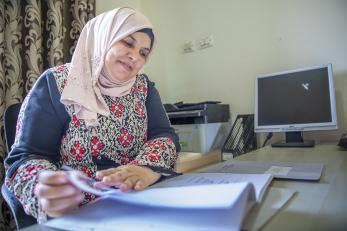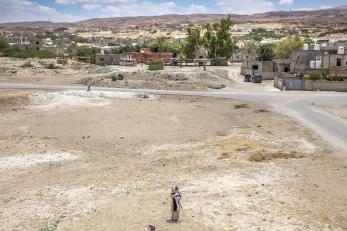Um Karam’s Journey with the “Building Communities’ Flood Resilience” Project

Raeda Abed, also known as Um Karam, is 43 years old and a resident of Sweimeh village, South Shuna District in the Jordanian Balqa Governorate. Um Karam spent her childhood in Amman before moving to Sweimeh 14 years ago. Um Karam is married and has five children, one of whom has a disability. In Sweimeh village, she has witnessed the challenges faced by the local community, including limited resources and frequent flash floods. She also experienced the high rate of poverty in the area and the lack of job opportunities, particularly for women who face significant challenges in finding jobs. Limited access to education and training as well as cultural norms that prioritise traditional gender roles, often restrict their ability to enter the workforce. These factors motivated Um Karam to establish “Dar Al-Karam”, a charity she founded in 2014. The organisation focuses on empowering and educating women, raising awareness about important societal issues, and supporting people with disabilities.
When Mercy Corps team asked me questions about the geography and topography of the Sweimeh area, I realised that I didn’t know much and I felt uneasy. This inspired me to continue my studies in surveying engineering to expand my knowledge of the area and help the community in Sweimeh. The support from the Mercy Corps team motivated me to complete my studies.
Um Karam has been an active participant in the “Building Communities’ Flood Resilience” project since it began in 2021. She took part in various activities and training provided by the project, such as writing policy papers, planning for advocacy, communication, and negotiation skills. Um Karam shared that she has never conducted a policy analysis or developed an advocacy plan, but through the training and practical activities, she gained fundamental knowledge on climate adaptation and disaster risk reduction as well as a better understanding of how to plan for advocacy efforts, "I had only heard terms like advocacy and policy influencing but was always unsure what they meant. The training provided me with a good understanding of how to identify climate problems, generate evidence, and then develop an effective advocacy plan to influence policy processes. Now I feel a lot more confident to interact with the policy makers in Sweimeh”

The project focused on raising awareness about the risks of flash floods in Sweimeh village, particularly during the rainy season due to its low elevation relative to sea level. Um Karam spearheaded several lobbying efforts with her colleague, presented policy papers, and advocated for conducting scientific studies to assess Sweimeh's topography, allocating budgets for flood prevention plans, and reducing flood risks. Although not all the recommendations have been accepted by local authorities, their advocacy efforts achieved some significant "wins." Throughout her engagement with the project, Um Karam was deeply inspired to continue her studies, driven by a desire to better serve the needs of the Sweimeh community. Her commitment to advocating for better policies and practices to enhance the resilience of Sweimeh against climate change remains unwavering.
In addition to her policy engagement, Un Karam also led a successful “Badir” public campaign in Sweimeh village, bringing together volunteers from the local community and Sweimeh Municipality employees to clean the valleys of waste and plankton that blocked rainwater and contributed to flash floods. This campaign fostered impactful collaborations between community members and local authorities. Um Karam’s efforts and leadership in the “Building Communities’ Flood Resilience” project has not only enhanced community awareness and resilience to natural disasters but has also sparked a sense of unity and volunteerism among the residents of Sweimeh village. Her dedication continues to drive positive change and make a lasting impact on the lives of those around her.